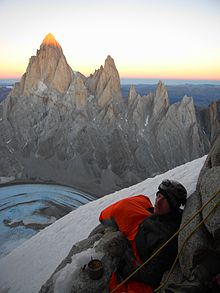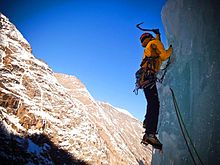Kristoffer Szilas | |
|---|---|
 Kristoffer Szilas at a bivouac during an ascent of Cerro Torre in Patagonia. | |
| Born | July 7, 1982 Copenhagen, Denmark |
| Nationality | Danish |
| Education | Ph.D. in geology |
| Alma mater | University of Copenhagen |
| Occupation(s) | Geologist and mountaineer |
| Website | http://www.kristofferszilas.com |

Kristoffer Szilas (born July 7, 1982) is a Danish mountaineer and geologist of Hungarian descent who lived in the US from 2012 to 2016.[1]
Mountaineering[edit]

Szilas has been on about a dozen climbing expeditions around the world, which have resulted in several first ascents of previously unclimbed mountains.[2][3][4] A few of these expeditions were carried out together with the American mountaineer Jess Roskelley according to Szilas' personal website.[1] Their most notable achievement was the first ascent of a route that they named the 'Hypa Zypa Couloir' on the Citadel in the Kichatna Range, Alaska.[5] In 2009 Szilas made the first ascent of the mountain Ren Zhong Feng in the Sichuan Province of China, and 2012 he completed the first ascent of a mountain in Kyrgyzstan, which he named Peak Lea after his wife.[3][4]
Geology[edit]
Szilas was trained as a geologist from the University of Copenhagen where he obtained a Ph.D. degree in 2012. He conducts research on some of the oldest rocks on Earth, found in SW Greenland.[6] Szilas has previously carried out postdoctoral research at Columbia University in New York and subsequently worked as a researcher at Stanford University in California.[7][8] He then returned to Denmark where he first worked as a postdoc at GEUS, and is currently an assistant professor at the University of Copenhagen. According to his personal statement his research: "focuses on the geochemistry and petrology of Archaean rocks from Greenland. It aims at understanding the relations between ultramafic and mafic-andesitic rock assemblages in order to place constraints on models for the evolution of the craton."[7]
References[edit]
- ^ a b "Personal website".
- ^ "First Ascent of Beautiful Chinese Peak".
- ^ a b "Danes Climb Ren Zhong Feng, Hungarians Missing".
- ^ a b "Bivouac: French for "Mistake" - Kyrgyzstan".
- ^ "New Grade VI Goes Up in Kichatnas".
- ^ "3.8 Ga Isua rocks". doi:10.1016/j.gr.2014.07.010.
{{cite journal}}: Cite journal requires|journal=(help) - ^ a b "Orcid".
- ^ "ResearchID".